|
|
|
Sort Order |
|
|
|
Items / Page
|
|
|
|
|
|
|
| Srl | Item |
| 1 |
ID:
145809
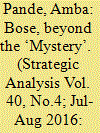

|
|
|
|
|
| Summary/Abstract |
Netaji Subhas Chandra Bose has featured prominently in the news—and hence the public consciousness—only from time to time. As was often the case earlier, the recent prominence he has been given has been confined largely to the classified files concerning him and the mystery surrounding his death—reported or real. Although public and media activism can be credited for the pressure built up which led to the partial declassification of files, it is time now to go beyond these limited aspects of the life and times of a personality as great as that of Bose. It is time now to start looking at other, greater aspects and perspectives that bring out the dynamic and multi-faceted life he led. Particularly the larger-than-life persona of Bose—Bose the philosopher, the leader, the statesman and then of course Bose the diplomat par excellence. All these aspects of his personality are clearly evident in his tryst with the Indian National Army (INA), the formation of the Provisional Government of Free India and his engagement with expatriate Indians/the Indian diaspora in Southeast Asia, which is exactly what this article attempts to bring out.
|
|
|
|
|
|
|
|
|
|
|
|
|
|
|
|
| 2 |
ID:
144142
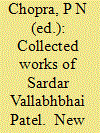

|
|
|
|
|
| Publication |
New Delhi, Konark Publishers Pvt Ltd, 2015.
|
| Description |
xxxii, 279p.hbk
|
| Contents |
Vol. VIII (1 January 1939 - 31 March 1940): Sardar Patel and Gandhiji differ with Congress
President Subhas Chandra Bose over Congress policies and programmes. oppose
Subhas's rel-election as Congress President.
|
| Standard Number |
9789322008444
|
|
|
|
|
|
|
|
|
|
|
|
Copies: C:1/I:0,R:1,Q:0
Circulation
| Accession# | Call# | Current Location | Status | Policy | Location |
| 058591 | 954.035/CHO 058591 | Main | On Shelf | Reference books | |
|
|
|
|
| 3 |
ID:
163027
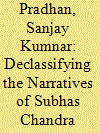

|
|
|
|
|
| Summary/Abstract |
With his glorious deeds, Netaji Subhas Chandra Bose worked tirelessly for the creation of a new India, with the internal supports and international mobilizations. The “rebellious son” of India was dissatisfied with the way the Indian National Congress (INC) and its leaders were working for India and its independence.
|
|
|
|
|
|
|
|
|
|
|
|
|
|
|
|
| 4 |
ID:
189612
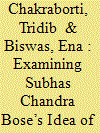

|
|
|
|
|
| Summary/Abstract |
Subhas Chandra Bose remains a leading personality who has symbolized himself as a leading freedom fighter, a true guide, and a devoted friend of the Indian masses and the world. As one of the chief architects of the Indian freedom movement, he awakened the country’s masses from the slavish siesta of self-degradation and stimulated their sense of its cultural, historical, and national glory. Throughout his political career, India’s liberation from British rule remained Subhas Chandra Bose’s foremost political goal, and his idea of nationalism is not only a political movement but an ethical one as well. This article will highlight the major rationale behind Subhas Chandra Bose’s contribution to promulgating the ideas of nationalism in the minds of the Indian masses.
|
|
|
|
|
|
|
|
|
|
|
|
|
|
|
|
| 5 |
ID:
152609
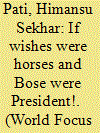

|
|
|
|
|
| Summary/Abstract |
I was a student of Ranihat High School at Cuttack in the mid-sixties. I will never forget how we used to eagerly look forward to January 23rd, the Birthday of Netaji Subhas Chandra Bose. All the boys of the school would wind our way to a mansion in Odia Bazaar and assemble there to pay our heartfelt homage to that great son of the soil. I distinctly recollect being overwhelmed by a feeling of patriotism and bravery as I listened to narrations about the exploits of Subhas Bose.
|
|
|
|
|
|
|
|
|
|
|
|
|
|
|
|
| 6 |
ID:
107834
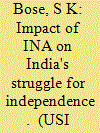

|
|
|
| 7 |
ID:
152602
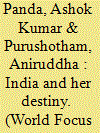

|
|
|
|
|
| Summary/Abstract |
The object of this thesis is to decipher and analyse India’s destiny, in the context of the struggle for freedom, in the first half of the twentieth century. The role and mission of Mahatma Gandhi, Netaji Subhas Chandra Bose and Dr. B.R. Ambedkar are central to our understanding of the developments, political and social, which culminated in India attaining political freedom in 1947.
|
|
|
|
|
|
|
|
|
|
|
|
|
|
|
|
| 8 |
ID:
123419
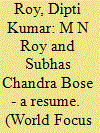

|
|
|
|
|
| Publication |
2013.
|
| Summary/Abstract |
The essay aims at analyzing the political behavior of M. N. Roy and Subhas Chandra Bose in the Indian National Congress from 1936-39. M. N. Roy joined the Congress as a Marxist with a view to radicalize the Congress and bring it under a revolutionary leadership. Subhas Chandra Bose as a leader of the left nationalist force in the Congress was also dissatisfied with general Congress policy and moderate way of Gandhian approach to the anti-colonial movement. During this period both of them came close to each other.
|
|
|
|
|
|
|
|
|
|
|
|
|
|
|
|
| 9 |
ID:
102554
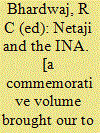

|
|
|
|
|
| Publication |
New Delhi, Lok Sabha Secretariat, 1994.
|
| Description |
ix, 158p.
|
|
|
|
|
|
|
|
|
|
|
|
Copies: C:1/I:0,R:0,Q:0
Circulation
| Accession# | Call# | Current Location | Status | Policy | Location |
| 055678 | 923.254/BHA 055678 | Main | On Shelf | General | |
|
|
|
|
| 10 |
ID:
091442
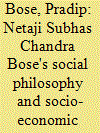

|
|
|
|
|
| Publication |
2009.
|
| Summary/Abstract |
It is well known that Netaji was an outstanding freedom fighter and during the last phase of our struggle he made the most outstanding contribution. However, it is not widely known that he was also a deep profound thinker. His thoughts were concentrated mainly on the problems and challenges that faced this country and aslo to find solutions for those.
|
|
|
|
|
|
|
|
|
|
|
|
|
|
|
|
| 11 |
ID:
152636
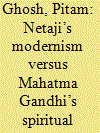

|
|
|
|
|
| Summary/Abstract |
Subhas Chandra Bose, being a Secularist, had an attitude of impartiality towards all religions. According to him, the Government of Free India must have an absolutely neutral and impartial attitude towards all religions and leave it to the choice of every individual to profess or follow a particular religion of his faith; Religion is a private affair, it cannot be made an affair of the State.
|
|
|
|
|
|
|
|
|
|
|
|
|
|
|
|
| 12 |
ID:
126647


|
|
|
|
|
| Publication |
2013.
|
| Summary/Abstract |
The recruitment of the all-female Rani of Jhansi Regiment of the Indian National Army in Japanese-controlled Singapore and Malaya, with a particular focus on the period between the first female guard of honour on 12 July 1943 through to the opening of the regiment's main camp in Singapore on 22 October 1943, has to date been insufficiently studied. Starting with the conception of the Regiment in an Axis submarine by the Indian nationalist leader Subhas Chandra Bose (1897-1945), this paper examines the ideas and figures that inspired the regiment and the role of Bose and Dr Lakshmi Swaminadhan (1914-2012) in mobilizing recruits. A division of labour can be distinguished, whereby Bose's rallies and speeches awakened a desire and commitment to join the regiment, whereas Dr Lakshmi used a door-to-door approach and access to homes to convince parents and to confirm participation. By 22 October 1943, 156 women and girls from among the Indian communities in Singapore and Malaya from a wide range of ethnic, social, religious and language backgrounds had joined the regiment that was part of Bose's plan to liberate India from British domination. Among the key sources used in this paper are Dr Lakshmi's late-1960s autobiography and the 2007 autobiographical account of one of her then 16-year-old recruits, Rasammah Naomi Navarednam (b 1927).
|
|
|
|
|
|
|
|
|
|
|
|
|
|
|
|
| 13 |
ID:
166420
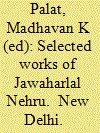

|
|
|
|
|
| Publication |
New Delhi, JawaharLal Nehru Memorial Fund, 2018.
|
| Description |
xxxi, 882p.hbk
|
| Series |
2nd Series
|
| Contents |
Vol. 78: 20 July - 30 September 1962
|
| Standard Number |
9780199494774
|
|
|
|
|
|
|
|
|
|
|
|
Copies: C:1/I:0,R:0,Q:0
Circulation
| Accession# | Call# | Current Location | Status | Policy | Location |
| 059671 | 954.042/PAL 059671 | Main | On Shelf | General | |
|
|
|
|
| 14 |
ID:
080529
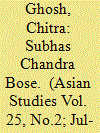

|
|
|
| 15 |
ID:
152598
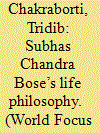

|
|
|
|
|
| Summary/Abstract |
Subhas Chandra Bose remains a leading personality, who has symbolized himself as a leading/dominant freedom fighter, a true guide and a devoted friend of the Indian people and the world. As one of the chief architects of the Indian freedom movement, he awakened the country’s masses from the slavish siesta of self-degradation and stimulated their sense about its cultural, historical and national glory. During his entire life period, he enlightened the Indian masses about their feelings, self consciousness and duties for the country’s independence and mankind. The philosophical foundation of Subhas Chandra Bose’s political thought, as a person of humanity, was developed based on the influences of several personalities, several international freedom struggle events, impact of parents, various religions and his personal experience of life. This article will highlight the multiple facets, which made Subhas Chandra Bose a true humanist and freedom fighter in the pages of Indian history.
|
|
|
|
|
|
|
|
|
|
|
|
|
|
|
|
| 16 |
ID:
157128
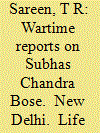

|
|
|
|
|
| Publication |
New Delhi, Life Span Publishers and Distributors, 2015.
|
| Description |
v, 216p.hbk
|
| Standard Number |
9789381709221
|
|
|
|
|
|
|
|
|
|
|
|
Copies: C:1/I:0,R:0,Q:0
Circulation
| Accession# | Call# | Current Location | Status | Policy | Location |
| 059290 | 954.0359/SAR 059290 | Main | On Shelf | General | |
|
|
|
|
| 17 |
ID:
178154
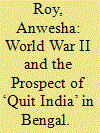

|
|
|
|
|
| Summary/Abstract |
This paper studies the years 1940–42 in Bengal with a view to analysing the social fuel that made the Quit India Movement possible in the province. War-time colonial policies created multiple disruptions and intrusions in the lives of the people of Bengal, building up anxieties and mass discontent. Coupled with widespread rumours, this profoundly reconfigured the image of the colonial state. This paper attempts to tap into the psyche of colonised minds in Bengal in the early stages of the war, which began to question British invincibility in the face of serious reverses in Southeast Asia. When a potent mix of mass discontentment and rumour was combined with ‘revolutionary’ political activism in the countryside, it acted as an explosive catalyst, animating the Quit India Movement.
|
|
|
|
|
|
|
|
|
|
|
|
|
|
|
|
|
|
|
|
|